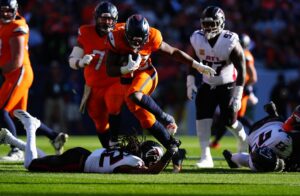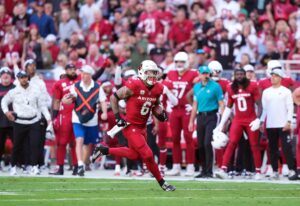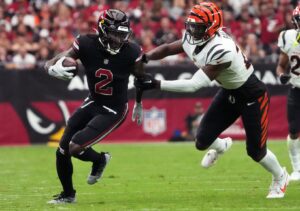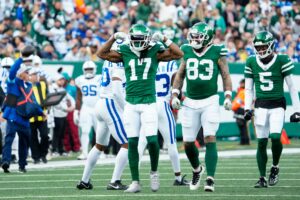The San Francisco 49ers took another important step to secure the number one overall pick in the 2019 NFL Draft, losing to the Seattle Seahawks 43-16 in week 13.
Analyzing the San Francisco 49ers Week 13 Loss
The 49ers have now lost nine consecutive games against the Seahawks. The last time the 49ers beat the Seahawks was back in December 2013. That last win came in San Francisco, though. The 49ers haven’t beaten the Seahawks in Seattle since December 2011. It’s nothing new that the Seahawks dominate the 49ers in Seattle, and this outcome really should not have surprised anyone.
From the very start of this game, there was never even the slightest indication that the 49ers were going to beat this clearly superior team. The Seahawks have now won three consecutive games, and look like one of the top contenders for a wild-card spot in the NFC playoff picture.
The 49ers fell to 2-10 on the season, and they are now 0-7 on the road. They’re the only team in the NFL that doesn’t have a road victory yet this season. The good news for them is that their next three games are all at home before traveling to Southern California to play the Los Angeles Rams in Week 17.
49ers Commit too Many Turnovers and Penalties
In what has been a reoccurring theme for the 49ers this season, they committed far too many costly turnovers. When they’re playing a much more talented team, they don’t have the luxury of being sloppy. They need to play more soundly if they expect to be able to win a game against an opposing roster that possesses more talent. The 49ers committed three turnovers, and each one of them had a profound impact on the scoreboard.
The first one came in the first quarter, right as the 49ers were driving down the field and looking to cut into a 13-0 deficit. It was first and 10 on the Seahawks 14-yard line and Bobby Wagner stripped the ball away from Jeff Wilson on the 3-yard line. Wagner had a hugely impactful game besides that fumble recovery, also returning an interception for a 98-yard touchdown in the fourth quarter. In both cases, the 49ers were on the verge of scoring touchdowns, but they instead ended up with no points to show for either of those drives. The Wagner interception returned for a touchdown basically initiated a 14-point swing that turned the game into an even bigger blowout.
The other costly turnover happened with two minutes to go in the first half and the 49ers trailing the Seahawks 13-0 in what was still a two-possession game. The 49ers defense had just forced the Seahawks into a three-and-out, and the offense was going to have a final possession to score some points before halftime. Instead of that, though, Richie James dropped the punt return and the Seahawks gained possession of the ball on the 49ers 33-yard line. The Seahawks proceeded to score a touchdown on that possession when Doug Baldwin hauled in a one-yard touchdown pass from Russell Wilson.
Had James not muffed the punt return, the 49ers would have most likely gone into halftime trailing 13-0 at worst and just 13-7 at best. However, a self-inflicted wound put the Seahawks up 20-0, and the 49ers had to march down the field in the final minute for Robbie Gould to kick a 45-yard field goal as the half expired. The Seahawks aren’t going to lose a game in which they’re up by three possessions at home by the second quarter so that Baldwin touchdown from the botched punt return basically sealed the final outcome of this game.
In a continuation of their propensity to hurt themselves, the 49ers also committed 13 penalties that game for 128 yards. The Seahawks looked nearly as undisciplined at times, finishing with 10 committed penalties of their own for 100 yards. The difference is that the Seahawks were playing with a gigantic home field advantage and a significant talent edge on the 49ers. They were able to overcome those mistakes to beat a team like the 49ers, while the 49ers can’t afford to be called for that many penalties.
49ers Can’t Deliver Solid Run Game
The Seahawks committed no turnovers, so it didn’t really matter that the 49ers were able to out-gain the Seahawks 452 yards to 321 yards. The Seahawks offense was efficient, and that was enough. The Seahawks averaged 6.8 yards per play, while the 49ers averaged 6.1 yards per play. The 49ers did most of their damage on offense through the air, while the Seahawks mainly utilized their rushing attack.
The difference was in the efficiency of the methods the teams relied less upon. The Seahawks averaged 8.2 yards per pass, while the 49ers averaged just 2.9 yards per rush. Matt Breida was banged up over the course of the game, and he was given just five rushing attempts and gained just six yards on them. Breida was still able to do some damage as a receiver out of the backfield, though, catching three passes for 51 yards. Wilson ended up leading the 49ers with 15 carries and 61 yards, while also hauling in a team-high eight catches for 73 yards.
Mullens and Pettis Develop Some Nice Chemistry
Dante Pettis had the best game of his career, catching five passes for 129 yards and two touchdowns, including a 75-yarder early in the fourth quarter. His other touchdown came early in the third quarter on a third and seven from the Seahawks 17-yard line that cut the lead to 27-10. Nick Mullens did a good job of spreading the ball around, as five different 49ers receivers collected at least 50 yards. George Kittle caught six passes for 70 yards, and Kendrick Bourne was able to haul in four catches for 60 yards.
Mullens finished 30/48 for 414 yards, 8.6 yards per pass, two touchdowns, one interception, and a 95.3 passer rating. The interception Mullens threw was his only serious mistake of that game, which is pretty remarkable given how the Seahawks pass rush was clobbering him. Mullens was sacked three times and hit 15 times that game, with Jarran Reed leading the way with six of those hits. The Seahawks sacks were collected by Wagner, Reed, and half-sacks going to both Justin Coleman and Quinton Jefferson.
49ers Defense Struggles Against Pass and Run
Wilson didn’t have to throw very often in this game, but he was able to effectively carve up the 49ers secondary when he did throw the ball. Wilson finished 11/17 for 185 yards, 10.9 yards per pass, four touchdowns, no interceptions, and a 140.9 passer rating. Wilson threw just two more incompletions that game than he did touchdowns, and the 49ers just didn’t have much of an answer for him.
The entire 49ers defense really struggled, as the Seahawks were able to assert their run game throughout and never really stumble. Chris Carson led the team with 13 carries and 69 yards, while Rashaad Penny had seven carries for 65 yards and a third-quarter touchdown. Penny ran for the 20-yard touchdown to open the second half after Tyler Lockett returned a kickoff for 84 yards.
Lockett also caught a 52-yard touchdown pass from Wilson early in the second quarter to give the Seahawks a 13-0 lead. Jaron Brown led the Seahawks with 67 receiving yards, two touchdowns, and tied for the team lead with three catches.
Maybe the one positive for the 49ers defense was that they were able to sack the elusive scrambler Wilson three times. DeForest Buckner had two of them and Ronald Blair had the other, and it’s always a big fear playing a mobile quarterback that he won’t be able to be contained if the pocket ever does break down.






